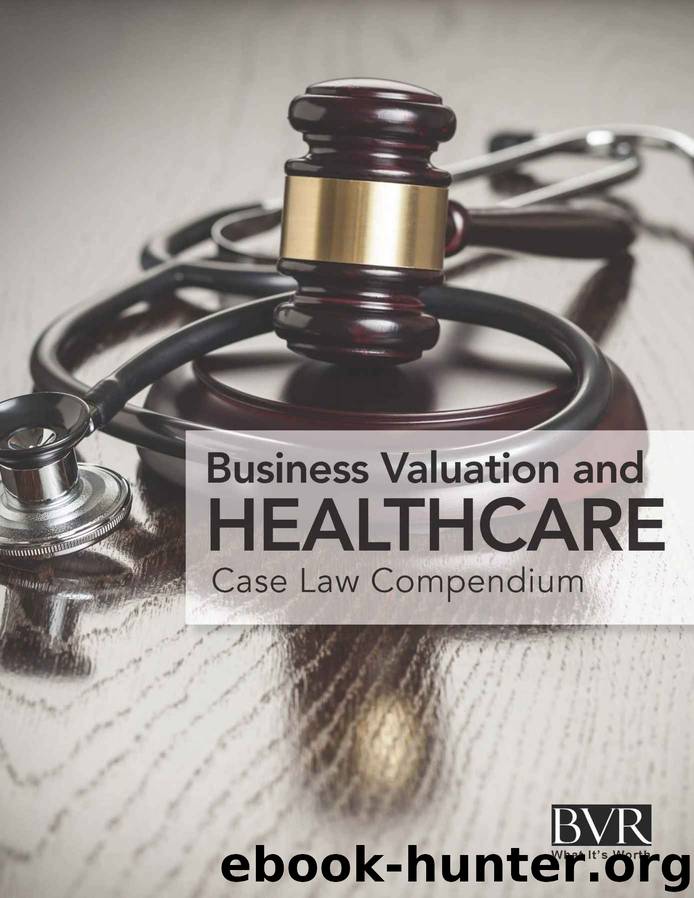BVR's Business Valaution and Healthcare Case Law Compendium by Sylvia Golden

Author:Sylvia Golden [Golden, Sylvia]
Language: eng
Format: azw3
Publisher: Business Valuation Resources
Published: 2017-01-20T05:00:00+00:00
Valuation methods. The court further discussed the five major formulas that are used in valuing goodwill, which it called:
• The straight capitalization accounting method;
• The capitalization of excess earnings method;
• The IRS variation of capitalized excess earnings method (based on Rev. Rul. 68-609);
• The market value approach; and
• The buy-sell agreement method. The court found that all of these methods were acceptable, that the excess earnings method was the most commonly used, and that the market value approach and buy-sell agreement methods were easily manipulated by the professional spouse.
Holding on appeal. The Court of Appeals found that the trial court did not abuse its discretion in rejecting the valuation of husband’s expert but found that the trial court’s reasoning was flawed. First, the expert did include a goodwill analysis as indicated by his testimony. Second, the discount for lack of marketability was inappropriate but not because the practice was not going to be sold. Rather, the discount was inappropriate because the expert did not provide a factual basis to support it in this case. Where proper factual basis is provided, a discount for lack of marketability may be applicable in a marital dissolution case.
The Court of Appeals further found that the trial court erred in adopting the valuation of wife’s expert because it included personal goodwill. Accordingly, the case was remanded to the trial court for revaluation of the dental practice consistent with this opinion.
West Virginia Supreme Court Rules Personal Goodwill Is Not a Marital Asset In Hillman H. May v. Carol S. May, No. 31123 (Nov. 10, 2003), the Supreme Court of West Virginia considered the issue of goodwill when valuing the practice of a sole practitioner. During the marriage, the husband solely operated a dental practice. During divorce proceedings, both parties provided expert testimony regarding the value of the practice.
The husband’s expert valued the practice at $55,000, which included a 20% lack of marketability discount. The wife’s expert valued the practice at fair market value, which he determined to be $120,000, inclusive of professional and personal goodwill. The trial court adopted the wife’s expert’s opinion of value. The husband appealed.
On appeal, the husband argued that the trial court erred in accepting the appraisal put forth by the wife’s expert. Specifically, he objected to the inclusion of goodwill in that appraisal. The Supreme Court began by noting that there is “a split of authority” regarding whether professional goodwill and/or personal goodwill may be included as marital property. Thus, it looked to other jurisdictions to determine whether inclusion of either goodwill is appropriate. It found that the majority of courts deemed professional goodwill to be marital property, but personal goodwill was not. The West Virginia Supreme Court fell in line with the majority of its sister jurisdictions. It stated,
“We hold that ‘enterprise goodwill’ is an asset of the business and may be attributed to a business by virtue of its existing arrangements with suppliers, customers or others, and its anticipated future customer base due to factors attributable to the business.
Download
This site does not store any files on its server. We only index and link to content provided by other sites. Please contact the content providers to delete copyright contents if any and email us, we'll remove relevant links or contents immediately.
International Integration of the Brazilian Economy by Elias C. Grivoyannis(57339)
The Art of Coaching by Elena Aguilar(50042)
Flexible Working by Dale Gemma;(22951)
How to Stop Living Paycheck to Paycheck by Avery Breyer(19216)
The Acquirer's Multiple: How the Billionaire Contrarians of Deep Value Beat the Market by Tobias Carlisle(11678)
The Radium Girls by Kate Moore(10910)
Thinking, Fast and Slow by Kahneman Daniel(10596)
The Art of Thinking Clearly by Rolf Dobelli(8850)
Hit Refresh by Satya Nadella(8340)
The Compound Effect by Darren Hardy(7565)
Atomic Habits: Tiny Changes, Remarkable Results by James Clear(7221)
Turbulence by E. J. Noyes(7044)
Tools of Titans by Timothy Ferriss(6952)
How to Be a Bawse: A Guide to Conquering Life by Lilly Singh(6695)
Change Your Questions, Change Your Life by Marilee Adams(6647)
Nudge - Improving Decisions about Health, Wealth, and Happiness by Thaler Sunstein(6636)
Win Bigly by Scott Adams(6319)
The Black Swan by Nassim Nicholas Taleb(6195)
A Court of Wings and Ruin by Sarah J. Maas(6095)
